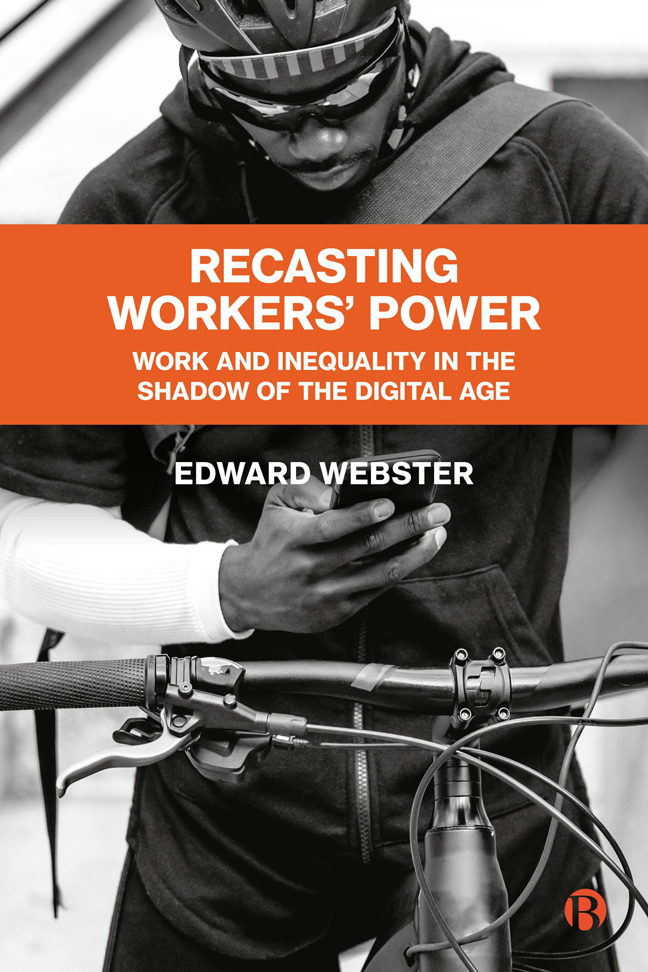Book contents
- Frontmatter
- Contents
- List of Figures and Tables
- List of Abbreviations
- Preface
- 1 The End of Labour? Rethinking the Labour Question in the Digital Age
- 2 Precarious Work after Apartheid: Experimenting with Alternative Forms of Representation in the Informal Sector
- 3 Neo-liberalism Comes to Johannesburg: Changing the Rules of the Game
- 4 Divided Workers, Divided Struggles: Entrenching Dualisation and the Struggle for Equalisation in South Africa's Manufacturing Sector
- 5 Authoritarian Algorithmic Management: The Double-edged Sword of the Gig Economies
- 6 Crossing the Divide: Informal Workers and Trade Unions
- 7 Global Capital, Global Labour: The Possibilities of Transnational Activism
- 8 Changing Sources of Power and the Future of Southern Labour
- Index
7 - Global Capital, Global Labour: The Possibilities of Transnational Activism
Published online by Cambridge University Press: 23 January 2024
- Frontmatter
- Contents
- List of Figures and Tables
- List of Abbreviations
- Preface
- 1 The End of Labour? Rethinking the Labour Question in the Digital Age
- 2 Precarious Work after Apartheid: Experimenting with Alternative Forms of Representation in the Informal Sector
- 3 Neo-liberalism Comes to Johannesburg: Changing the Rules of the Game
- 4 Divided Workers, Divided Struggles: Entrenching Dualisation and the Struggle for Equalisation in South Africa's Manufacturing Sector
- 5 Authoritarian Algorithmic Management: The Double-edged Sword of the Gig Economies
- 6 Crossing the Divide: Informal Workers and Trade Unions
- 7 Global Capital, Global Labour: The Possibilities of Transnational Activism
- 8 Changing Sources of Power and the Future of Southern Labour
- Index
Summary
We begin this chapter by focusing on how neo-liberal globalisation has undermined the post-war Keynesian consensus built around the notion of social dialogue and a tripartite social partnership between employers, government and labour. In its place global governance is increasingly privatised, driven by global corporations in pursuit of shareholder value (Bakan, 2020). We go on to examine, in Part I, a private for-profit corporation, BIA, that presents itself as providing a solution for the educational needs of low-income families in Kenya and Uganda through digital technology. Instead local unions found, with the assistance of their GUF Education International (EI), that digital technology was being used to de-professionalise teachers and to cut costs drastically. BIA achieves this goal by substituting qualified teachers with low-paid and under-qualified individuals who transmit scripted instructions to pupils through ‘teachercomputers’. By openly advancing this form of low-fee, for-profit provision as an alternative to public schools, BIA represents a direct challenge to public education. Long neglected, we argue that global unions are emerging as players in this contest, helping to build counter power at both the local and global level. Through their intermediary coordinating role at the supranational level, global unions can deepen worker power.
A ‘new corporation movement’ has emerged, believing that by reimagining capitalism business can simultaneously pursue profit and bring prosperity and well-being to society as a whole (Henderson, 2020). Tech giants such as Uber, Amazon and Google have gained unprecedented levels of power. Their business model is based on a new form of algorithmic control where ‘workers’ are managed through online platforms, monitored indirectly and expected to produce measurable outputs (Tassinari and Maccarrone, 2020). As argued in Chapter 5, a global process of uberisation of work is taking place. This presents the labour movement with a challenge: on the one hand, it deepens the exploitation of labour on a global scale, while on the other hand, it is leading to opportunities for organisational innovation through new forms of transnational labour activism.
Drawing on the power resources approach, the chapter explores these opportunities through a case study of BIA, where technology has deprofessionalised teachers in Kenya and Uganda and undermined education unions.
- Type
- Chapter
- Information
- Recasting Workers' PowerWork and Inequality in the Shadow of the Digital Age, pp. 144 - 157Publisher: Bristol University PressPrint publication year: 2023

